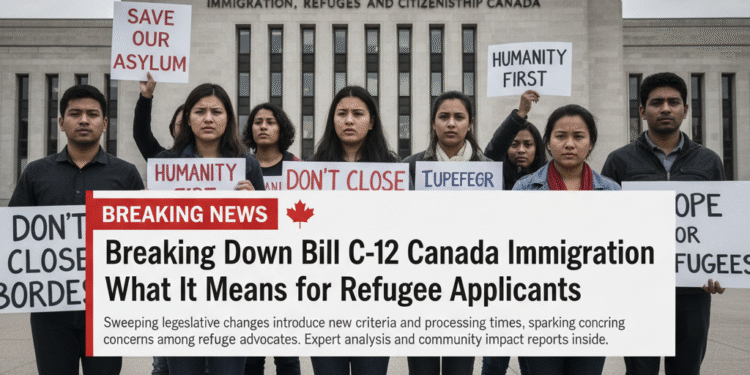Bill C-12 Canada immigration reform is quietly reshaping how refugee protection works in Canada. Under this new federal legislation introduced in 2025, many people who arrived after June 24, 2020 and file a refugee claim more than one year after arrival could now be denied a full hearing before the Immigration and Refugee Board (IRB).
Instead, their cases may be redirected to a pre-removal risk assessment (PRRA) — a faster but far more limited process with much lower approval rates. Supporters argue that Bill C-12 will help restore integrity to Canada’s asylum system, while critics warn it could unfairly block genuine refugees from accessing protection due to missed deadlines, fear, or lack of legal help.
What the bills actually propose
- One-year rule: If you first entered Canada after June 24, 2020, and you apply for refugee protection more than one year after that entry, your claim would generally not be referred to the IRB for a full refugee hearing. That is a core change in the Strong Borders / Bill C-2 measures now folded into the government’s border-security package.
- Irregular U.S. land-border crossings: People who cross irregularly from the United States and wait longer than a short window (the legislation sets a 14-day limit in some versions) may also be ineligible for a full IRB hearing
- Route to PRRA: Affected claimants would instead be eligible for a pre-removal risk assessment (PRRA) — an IRCC-run screening to check whether removal would expose them to persecution, torture, or death. PRRAs are legally important but are a narrower, administrative process than a full IRB hearing.
- Wider ministerial powers: Bill C-12 (the later border/security package) also proposes broad discretionary powers for the minister/department to pause, cancel, or amend immigration documents and applications “in the public interest.” The legislation intentionally leaves “public interest” loosely defined, which critics say is ripe for arbitrary application.
How much harder is a PRRA than a full refugee hearing?
The practical difference matters: historically, PRRAs approve far fewer applicants than first-instance IRB hearings. Government data and reporting used by news outlets show PRRAs for people found ineligible for hearings were approved at roughly 30% in 2019, while finalized IRB refugee decisions that year approved about 60% of claimants — a stark contrast. Advocates point out that PRRAs are often a claimant’s last chance and do not provide the same procedural safeguards as an IRB hearing.
Government argument: restore integrity, deter abuse
Immigration Minister Lena Metlege Diab and other government supporters defend the measures as necessary to “restore integrity” to the asylum system and to stop the system from being used as a “shortcut to immigrate.” They frame the bills as tools to fix backlogs, deter organized-crime-linked flows (including fentanyl trafficking), and give border agencies stronger tools to protect public safety. Minister Diab has stressed flexibility — including leaving the “public interest” trigger broadly defined so the government can respond to evolving threats.
Critic’s Case: doors closed to the most vulnerable
Human-rights groups, refugee lawyers, and several former officials argue the changes will punish genuine refugees who, for wholly legitimate reasons, did not or could not file within one year — for example:
- survivors of trauma who delay because of fear or disorientation
- people who lacked legal help or information;
- those who fled escalating violence and only later learned they could claim protection.
Opponents also warn the “public interest” power is dangerously vague and could be used to cancel or pause many legitimate applications or even study permits and work permits en masse. Legal and health groups have produced briefs and factsheets warning the bills could funnel people into precarious, unsupported situations and increase the risk of deportation to danger.
Real-world effects of Bill C-12 who should worry?
- Arrived after June 24, 2020? If you entered Canada after that date and are thinking about claiming asylum, timing now matters: a delay beyond one year could change the process you face.
- Crossed from the U.S. irregularly? Be aware that there are shorter windows and stricter rules for those entry routes.
- Already in Canada with a pending file? The bills would give the government power to pause, cancel, or alter applications; people with open files should track developments and get legal advice.
- Legal help is vital. Because the PRRA is narrower and historically harder to win, anyone facing potential ineligibility for an IRB hearing should urgently seek qualified immigration and refugee legal advice or help from community organizations.
Bottom line
These bills mark a substantive policy shift: Canada would systematically narrow access to full refugee determinations for a wide group of recent arrivals, redirecting them to a risk-assessment mechanism with lower historical success rates and fewer procedural protections.
Supporters say the changes are necessary to protect the immigration system and public safety. Opponents warn they will close doors to people who are genuinely fleeing persecution and will create new legal and humanitarian problems. The bills still have to move through parliamentary stages and will likely face legal scrutiny and public debate.
















